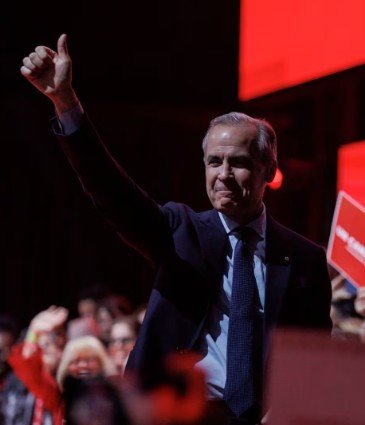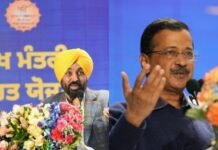Saptrishi Soni : In a closely watched election that unfolded against the backdrop of an escalating economic standoff with the United States, Canada’s Liberal Party, led by Prime Minister Mark Carney, emerged victorious on Monday — but fell short of securing a definitive majority. While the result reaffirms Carney’s political relevance and offers a platform to confront a turbulent Washington, it also exposes the fragile mandate with which he must now navigate one of the most volatile chapters in the modern Canada–US relationship.
Early projections from Canadian broadcasters CTV and CBC showed the Liberals leading or elected in 165 of the country’s 338 electoral districts — seven seats short of the 172 needed for a majority in the House of Commons. The opposition Conservative Party, led by Pierre Poilievre, conceded with 147 seats, while the separatist-leaning Bloc Québécois and Jagmeet Singh’s New Democratic Party (NDP) secured 23 and 7 seats respectively.
The election was deeply shaped by external forces — chiefly the protectionist posturing and trade belligerence of US President Donald Trump. In an election-day message that stunned many in Ottawa, Trump renewed his threat of tariffs on Canadian goods and made vague references to annexation, a rhetorical provocation that critics say echoes a broader pattern of nationalist brinkmanship. Carney, an economist-turned-politician who once served as the Governor of the Bank of England, had framed the vote as a crucial step to gaining the authority needed to “defend Canada’s sovereignty” in an era of economic uncertainty and diplomatic strain.
Addressing supporters in the capital after the results, Carney struck a defiant but measured tone. “We must never forget the lessons of betrayal from our closest neighbor,” he said, in what analysts interpreted as an unusually sharp rebuke directed at the Trump administration. “We will win this trade war,” he added, though he cautioned Canadians to brace for “challenging” days ahead.
Trump’s relationship with Canada has veered from transactional to openly confrontational. His administration’s previous renegotiation of the North American Free Trade Agreement (NAFTA), now recast as the USMCA, exposed structural imbalances and triggered nationalist sentiment on both sides of the border. The latest wave of proposed tariffs and annexation rhetoric — the details of which remain ambiguous — has further fueled anxiety in Canada’s political establishment.
The geopolitical undercurrent shaped much of the Liberal campaign strategy, which emphasized national unity, economic resilience, and reassertion of Canadian identity in global trade. But the party’s inability to clinch a majority raises questions about whether voters are fully aligned behind Carney’s combative approach. Many Canadians, still weary from the pandemic’s economic aftershocks, remain divided on how to best manage the country’s largest trading relationship without igniting a deeper economic crisis.
Conservative leader Poilievre, who had previously advocated for a more conciliatory posture toward Washington, accepted the results with a pledge to cooperate. “We will always put Canada first,” he told supporters, adding that his party would work with the Liberals and other groups to “get a new trade deal that puts these tariffs behind us while protecting our sovereignty.”
International observers are closely watching Canada’s next steps, as the country is increasingly cast into the role of testing ground for how middle powers can respond to assertive neighbors. With climate change, economic decoupling, and democratic backsliding reshaping global alliances, Ottawa’s response to Trump’s threats could set the tone for similar dynamics elsewhere.
For Carney, the coming months will be a delicate dance: maintaining Canada’s economic stability, repairing trade ties, and rallying a Parliament that reflects a fragmented political consensus. But for now, the Liberals have earned another shot at leading — if not from a position of strength, then at least with clarity of purpose.
#CanadaElection #MarkCarney #USCanadaTrade #TrumpTariffs #GlobalDiplomacy
This is an auto web generated news web story. Pic courtesy Net




